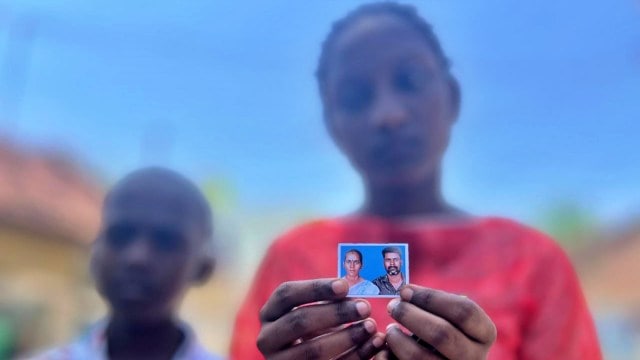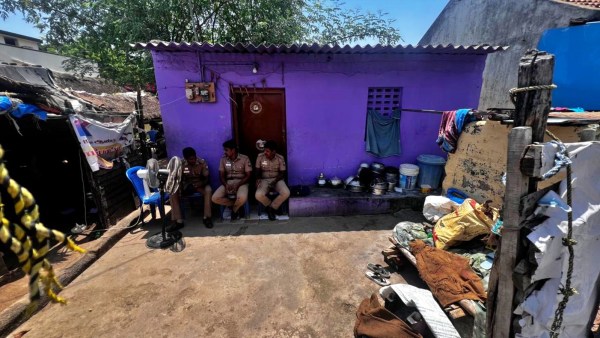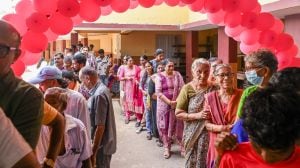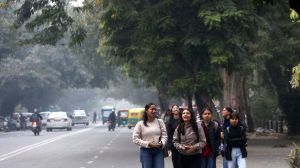‘It was like entire village was drunk’: 54 deaths expose how Tamil Nadu authorities let hooch trade flourish, denied its aftermath
At Karunapuram village, as families mourn the dead, those who survive grappled with the haunting realisation that their means of escape became their undoing
 Kokila and her younger brother with a photo of their parents, Suresh and Vadoogarasi, both of whom died. (Express Photo by Arun Janardhanan)
Kokila and her younger brother with a photo of their parents, Suresh and Vadoogarasi, both of whom died. (Express Photo by Arun Janardhanan)Men staggering home drunk is not an unusual sight in the village of Karunapuram in Tamil Nadu’s Kallakurichi. Last Tuesday, however, the daily routine of intoxication claimed 54 lives and left over 100 hospitalised when illicit liquor – a mainstay in the village’s underbelly – brought tragedy to the doorstep of the poorest of the poor.
Five arrests have been made, including Govindaraj alias Kannukkutti, the 48-year-old who allegedly sold the spurious liquor that killed most of the victims. Govindaraj, who has been selling arrack – a distilled alcoholic drink – for 20 years, is well-known in the area. His wife and brother were also detained, along with Chinnadurai, the alleged supplier of the spirit, and Mathesh, who police say is the kingpin who sourced the methanol. Despite his role in the trade, Govindaraj, a heart patient, never drank the concoctions he sold.
Municipal Corporation wards 7, 8, and 9 in Karunapuram, where most residents are from the Scheduled Castes, bore the brunt of the tragedy, witnessing 32 deaths. Ward 7 is where Govindaraj’s godown is located, while his busy shop is in ward 8.
Talking to The Indian Express on Saturday, Palraj, the four-time independent counsellor, said that “on Tuesday night, the wrongly mixed poisonous spirit was put on sale”. A top official who is part of the CB-CID probe said Chinnadurai allegedly insisted that the spoiled spirit be sold off somehow.
The peak sale was between 5 am and 7 am, when conservancy and headload workers start their day and consume the liquor almost like morning tea. Gurumurthy, who works in the flower marker and was a regular customer at Govindaraj’s shop, said “Kaasu irundha bottle, illana packet [if there is cash, we buy (Tasmac) bottles, otherwise (arrack) packets].”
By Wednesday, the effects were already devastating. Two deaths were reported early that morning, and as Palraj went to pay his respects, he began to unravel the tragic backstory.
‘Political pressure to downplay’
“The first calls about deaths came around 8.30-9 am,” Palraj said. “I went to see the victims, Suresh and Praveen, who had consumed the packet liquor the previous night. Praveen was found on the road. I informed the village panchayat officers and health department officials. By 10 am, another case emerged – Sekhar from the same area was taken to the hospital, but he lost his vision and died shortly after,” Palraj said.
Despite the growing evidence of a mass poisoning, the district collector, who has since been transferred, issued a statement in the morning, denying that the deaths were due to illicit liquor. “The collector’s denial was shocking,” Palraj said. “The assembly session was to begin in Chennai; it seemed there was pressure to downplay the incident.”
 Kalyanasundaram’s mother and sisters await his body. He died on Saturday morning. (Express Photo by Arun Janardhanan)
Kalyanasundaram’s mother and sisters await his body. He died on Saturday morning. (Express Photo by Arun Janardhanan)
As the day progressed, more cases were reported. Municipality workers and police conducted door-to-door searches, trying to identify those who had consumed the lethal brew. Many victims were hesitant to admit to drinking the illicit liquor. “It was like the entire village was drunk. We went to every house,” Palraj said. “By the end of the day, at least 50 people had been sent to the hospital through our door-to-door survey. Many more went on their own as their condition worsened.”
The delay and initial denial had tragic consequences. “The collector’s statement misled many,” Palraj said. “Those who had stock of the liquor continued to drink it. More than a dozen people died by Wednesday evening. Those who sought early medical help survived, though some lost their vision.”
“Even though there were usual police raids, they (those in the liquor trade) were always informed in advance,” Palraj said, alleging that officers at the local station were aware of the activities but took little action.
As the bodies piled up, so did the anger and questions. Opposition AIADMK MLA M Senthil Kumar has raised the Kallakurichi issue multiple times – in the assembly and public meetings. “They ignored it because I am an opposition MLA,” he said. “It became so bad that every street had people selling illicit liquor. What’s the point in doing anything now? Whoever it is, it is a life. A poor man is the most vulnerable. If you pay them Rs 1 lakh or 10 lakh compensation, they will be surprised as it is a big amount. The government did not expect this level of tragedy, so the collector tried to cover up initially… Govindaraj was the mere face of it. He used to pay money to everyone. The government should take action against DMK leaders, MLAs, and councillors who were supporting Govindaraj.”
Vijay Manoj, the husband of ward 8 councillor of the DMK, Vimala, denied the allegations: “We warned them, complained, but they would shut shop and come back. We haven’t taken any money.”
 At Govindaraj’s shop, where the illicit liquor was sold in packets for Rs 60. (Express Photo by Arun Janardhanan)
At Govindaraj’s shop, where the illicit liquor was sold in packets for Rs 60. (Express Photo by Arun Janardhanan)
Desperate times, deadly measures
When The Indian Express visited a dozen victim families in Karunapuram on Saturday, the entire village, once numb to the sight of drunkenness, was struggling to reconcile with the aftermath of a preventable tragedy. Families mourned their dead, while the living grappled with the haunting realisation that their means of escape had become their undoing.
Two months before the local elections, the district police had launched a significant raid, nearly halting the illicit liquor flow from Vellimalai. “This crackdown forced sellers like Govindaraj to turn to more dangerous alternatives. Methanol, a cheaper but lethal substitute, replaced the usual rectified spirit. The mixture went wrong, with fatal consequences,” said a top police official who had raised red flags in the last two years.
The raid stopped the supply but not the demand, pushing desperate sellers to deadly measures. Govindaraj’s concoction required a delicate balance – 25 litres of spirit mixed with six times as much hot water. But the lethal brew sold that night lacked this precision. Priced at Rs 60, it was packaged in flimsy plastic bags, tied with a string. Regular customers, oblivious to the danger, lined up early at Govindaraj’s shop. The headload and conservancy workers, exhausted from their labour, sought solace in these packets before dawn.
By 5 am, the shop was bustling. Govindaraj’s customers, some buying multiple packets to sustain their day, trusted the routine.
In Karunapuram, the tragedy was not just a tale of drunken men but of suffering women. Shankar, an auto driver, said: “The men work just to drink, and the women run the family. Among the victims, 30% used to bring home a meagre 25% of their earnings. The remaining 70% were of no use to their families at all, spending everything on liquor,” said Shankar from Joghiyar Street, which had the most victims – 23 deaths from about 60 families living there.
The poison spared no one, claiming five women as well. In a community where drinking was an accepted escape, it was still taboo for women. Every family insisted that the women who died were not drunkards. They claimed these women mistakenly drank the liquor when their husbands poured it into a glass.
Suresh and Vadoogarasi, both in their 40s, died, leaving their three minor children orphaned. “My son was a painter who drank often,” said his mother, Rani. “He bought two packets, consumed one, and poured the second into a glass. My daughter-in-law mistakenly drank it. She was brought dead to the hospital. Suresh died an hour later.” Their eldest daughter, Kokila, said, “My parents wanted me to pursue engineering, but I wanted to become a dancer. Now that they are dead, I will become an engineer.” She has two younger brothers, Harish and Raghavan.
Rajendran, 60, who died on Thursday evening, bought two packets, stayed at home, and drank as usual on Wednesday. “He denied drinking when officers asked,” said Kolanji, his wife, a domestic help. “They go for illicit liquor because they cannot afford the Tasmac bottles. They start buying packets early in the morning because Tasmac shops open only at noon.”
Valarmathi, a resident of Karunapuram ward 7, said her husband Vijayakumar, a tea master, lost his eyesight. “He survived the impact because they did dialysis. We have four children, and I run the family on my own,” she said.
Gajalakshmi, a municipal conservancy worker, said her husband had a narrow escape as he was unwell for a week. “Otherwise, he would have been one of the victims. He doesn’t work, just drinks. If he works, it’s to buy this Rs 60 packet. I work and run the family,” she said.
The tragedy also sparked grim disputes among families. One of the deaths led to a standoff between the victim’s first and second wives. Both demanded his body; the government compensation awaits the claimant.
- 01
- 02
- 03
- 04
- 05































